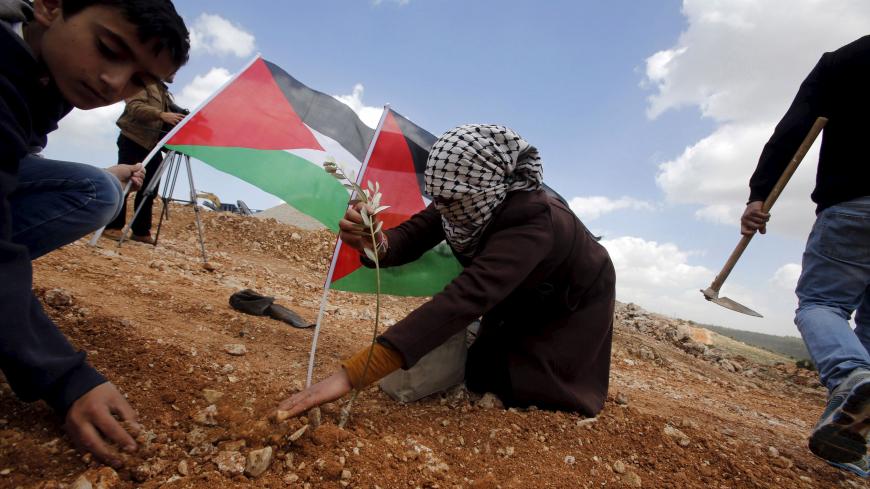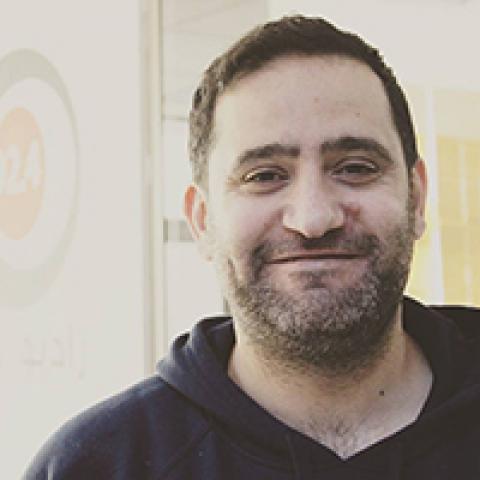AMMAN — Children wearing the traditional costumes of Palestinian farmers and others cloaked in Palestinian flags flocked to the Husna FM Radio building in the Jordanian capital Dec. 3, carrying with them monetary donations to help cultivate land in Palestine.
The donations from the children and their families came as part of the “Plant Your Resilience” campaign by the Arab Group for the Protection of Nature. Through a day of fundraising, the initiative invited the public to donate to cover the costs of cultivation and drilling wells to help Palestinian farmers whose lands are threatened with expropriation by Israel in the West Bank, Jerusalem and the Gaza Strip. The campaign asked for donations in various amounts, such as $7 to cover the price of planting a single tree, $282 to plant trees in one dunam (about a quarter acre) of land and $70 to contribute to drilling a well costing $5,000.
“The campaign is returning for its third year to sponsor Palestinian farmers and promote their resilience. We hope to protect additional lands and villages threatened with confiscation by the Israeli occupation,” Mohammed Qateishat, the group's project director, told Al-Monitor.
“Over the past two years, the campaign succeeded in protecting approximately 2,000 dunams [494 acres] of land in [and around] Jerusalem from confiscation by Israel, whose land law allows the appropriation of uncultivated lands. The campaign was launched in this context while also supporting Palestinian farms by constructing wells,” he said. “During the previous two years, the campaign managed to secure 804 Palestinian farmers on their threatened land by planting some 51,000 fruit trees of various kinds and drilling 11 wells in Jerusalem, the West Bank and Gaza.”
The campaign comes after US Secretary of State Mike Pompeo declared Nov. 18 that the United States was reversing its previous stance that the Jewish settlements in Jerusalem and the West Bank were inconsistent with international law.
As Qateishat sees it, the campaign carries a message for the US administration. “The settlements have never been nor will be legal and we will continue to cultivate Palestinian land, especially close to settlements to prevent them from expanding at the expense of Palestinians,” he said.
Through partners in Palestine, the organization purchased trees and planted them on properties at risk of confiscation. In its third year, the campaign raised $155,000 to subsidize the cost of tree planting and wells.
Husna Radio director Hossam al-Gharaibeh told Al-Monitor that the station received hundreds of calls during the fundraiser from Jordanians young and old, who were eager to sponsor tree-planting in Palestine. Among them was seven-year-old Ayah Hatamlah, who contacted the station to donate the cost of five trees.
One low-income citizen among the callers phoned in thinking that the campaign was collecting donations to support needy families in Jordan. When Gharaibeh explained to him that the goal was to protect Palestinian land from expropriation, he pledged his support, donating to purchase a tree despite his own financial hardships.
Gharaibeh also recounted the story of Jerusalem resident Ibrahim Sobeih, who contacted the radio, explaining that he owns 45 dunams (11 acres) of land near the separation wall in Jerusalem that he inherited from his father. Israeli forces had attempted to coerce him into giving up his land by arresting him repeatedly. When that approach failed, they offered Sobeih some $28 million for his land, but he refused. “When this individual knows that his land has been cultivated through donations, his resilience will be strengthened and he will feel a sense of moral support,” Gharaibeh said.
“We heard from Jordanian donors and residents of the country of various nationalities,” Gharaibeh told Al-Monitor. “Even Jordanian officials personally donated to the campaign, though they wanted to remain anonymous. Donors were from all regions of the kingdom and from across different age groups. We received calls from the Badia, Palestinian refugee camps and Jordanian villages, and contributions from Egyptians, Syrians and Iraqis living in Jordan. Jordanian society is active and concerned when it comes to Palestine, especially in light of the Netanyahu government’s annexing of Palestinian land and expansion of settlements, as well as the bias of the American administration toward the occupation.”
He explained that Husna Radio participated in the campaign because “the resilience of the Palestinians on their land is seen by citizens as one aspect of our own national strategic security."
The campaign also distributed money boxes at the radio office for children to collect donations all year to support Palestinian farmers. “The idea is that children continue to remember the Palestinian cause throughout the year as they collect funds,” Gharaibeh explained.
According to a report issued by the National Bureau for Defending Land and Resistance to Settlements, affiliated with the Palestine Liberation Organization, the Israeli authorities seized some 2,522 dunams (623 acres) of land in the West Bank from Nov. 23 to Nov. 29.
They included 129 dunams in the towns of Dhahirah and Al Samou, south of Hebron, 243 dunams of lands in the village of Surif northwest Hebron, around 150 dunams in Beit Liqya west of Ramallah and 2,000 dunams in the village of Al Jab'a, southwest of Bethlehem, and along the western West Bank all the way to the settlement of Beit Ayin. Another 500 dunams were confiscated in the town of Hazma, east of Jerusalem.







